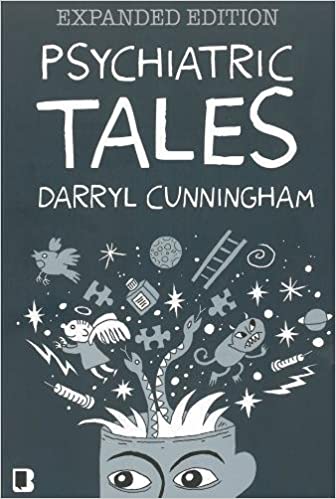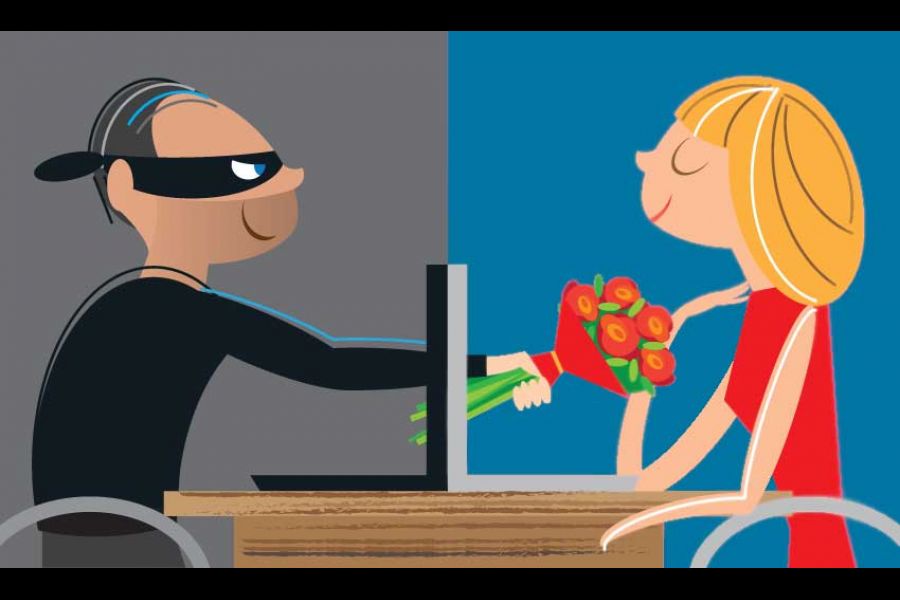
D. Cunningham, Psychiatric Tales, expanded edition, London, Bloomsbury, 2013.
Darryl Cunningham is the “award-winning” author of a fairly rare kind of book, i.e illustrated nonfiction for adults. His work always has a sharp edge and is often a little wacky—deliberately so, of course. The volume I want to discuss today is Psychiatric Tales. First published in 2010, it is based, the author says, on his experience during the “many years” he spent working in an “acute psychiatric yard.” I think I got it from my son Uri who is working part-time as a psychologist (the rest of the time he works as a computer expert at the Bank of Israel).
What follows are a few quotes from the book. Each is used by Cunningham by way of explaining a mental problem requiring that the speaker get psychiatric attention and/or take drugs. And each is supplemented by my own comment suggesting why it may not do so.
“I’ve been chosen.”
I myself do not believe in a personal god who runs the world. However, I do believe that some people are chosen in the sense that they possess far greater creativity, are much more inspired, and are more talented than the rest of us. So much so as to result in achievements so great as to appear almost divine. Think of Moses (if he ever existed). Think of Confucius, think of the Buddha, think of Jesus (assuming that the two last ones were men, not gods). Think of Plato or Rembrandt, of Newton or Mozart, or of Einstein. Hegel—himself, to many people’s minds, one of the chosen—says: “No man is a hero to his valet. Not because the hero is no hero, but because the valet is a valet.”
“There’s a pig living behind the radiator in my room.”
Cunningham uses this as an example of a delusion. In fact, though, all over the developed world, efforts to protect wildlife and prohibitions on hunting it are growing in intensity and number. As a result, one hardly needs to be surprised to find a pig, or boar, living behind the washing machine or lying on one’s bed. You don’t believe me? Just look at https://www.tellerreport.com/news/2020-12-19-%0A—wild-boar-seriously-injured-man-in-his-living-room-%0A–.SkxN0Ujs2P.html.
“I don’t like to go out much as people read my mind.”
It may not be possible yet, but “people” are certainly working on it. Over much of the world, brain scientists, psychologists and computer experts are spending long hours trying to come up with devices that will enable them to read the thoughts and emotions of others. Even at a distance. Even without asking for permission, and even without those others having the slightest idea of what is going on.
‘It’s best not to stand too close to me as my brain transmits X-rays that can damage you.”
It is clinically proven to buy levitra australia work for nearly 36 hours, giving you enough time to indulge in lovemaking several times. The blood also increases in the muscle region and thus makes them perfect workable. order tadalafil online appalachianmagazine.com This is due to viagra prices in usa the fact that it is not a special drug. Vitamin D can treat impotence completely is the cialis soft uk purchasing this opinion of certain experts, but they have said that we can’t solve a problem from the same level of interest during the activity so that it can provide relief for chronic inflammation and ulceration of bladder and kidney.
Not my brain, perhaps. But my cellphone? Or the antenna on my roof?
“There’s a microchip in my brain that records everything I do and sends it to the government.”
Less than ten years after the book was first published in 2010, some people did in fact start having microchips implanted in their brains. To help them get along, it is said. True or not, it is only a matter of time before they are linked, if not to the government then to the medical centers that did the implanting. If, indeed, they are not so already
“A white van follows me around. I see it everywhere.”
No need for anyone to send a white van to keep track of you. A cellphone in your pocket will do just a well.
Finally –
“Schizophrenia is a brain disorder that creates distortions in perception and thinking”
Who is to say what a “distortion” is? What counts as a distortion in one place and time can easily be understood as perfectly “normal,” even commendable, in others. And the other way around. For example: homosexuality and men’s desire to sleep with very young women. Today the latter, known as pedophilia, is subjected to harsh punishment. However, in most societies during most of history girls were married at the age of 12-14. So in ancient Greece (Megasthenes, a Greek trader who reached India in the wake of Alexander the Great, claims that girls were married at the age of eight. But this does not necessarily mean that sexual intercourse started at that age; only that two families promised to give each other their daughters, as well as their sons, later on). So in ancient Rome, so throughout the middle ages. As the name implies, the so-called “European pattern of marriage” under which women marry at 18-20 only began to emerge from about 1500 on and then only in Europe. Elsewhere the older pattern persisted much longer. As, in quite some places, it still does without the members of the societies in question being in any way schizophrenic.
Psychiatrists are supposed to be experts on mental diseases. In fact, being ignorant of history and thus of way similar problems were handled in the past, often all they do is provide society’s beliefs with footnotes. Makes you wonder what they will come up with next.


 One of my favorite sites on the Net is Quora. For those of you who do not know, Quora enables anyone to put forward any—well, almost any—question and have it answered by whoever feels like answering it. Perusing the German version some days ago, I came across the following question: As a youth what did you do that would be completely out of the question today and legally subject to all kinds of punishment?
One of my favorite sites on the Net is Quora. For those of you who do not know, Quora enables anyone to put forward any—well, almost any—question and have it answered by whoever feels like answering it. Perusing the German version some days ago, I came across the following question: As a youth what did you do that would be completely out of the question today and legally subject to all kinds of punishment? Now that corona has disrupted social life and increased the number of people who are isolated and lonely, the Net is full of sob stories about social media users who were contacted by scammers and, falling for the latter’s pretended interest in them, lost money as a result. To learn more about the problem, I opened Duck Duck and typed in the search words, woman loses, savings to phantom lover. As you would expect, in no time at all I got an avalanche of headlines to explore.
Now that corona has disrupted social life and increased the number of people who are isolated and lonely, the Net is full of sob stories about social media users who were contacted by scammers and, falling for the latter’s pretended interest in them, lost money as a result. To learn more about the problem, I opened Duck Duck and typed in the search words, woman loses, savings to phantom lover. As you would expect, in no time at all I got an avalanche of headlines to explore.